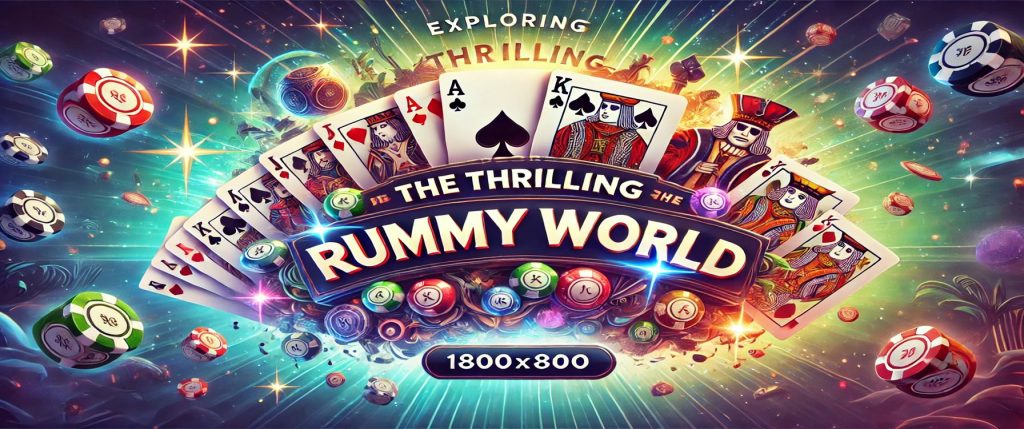Description

The Complete Handbook of Rummy: History, Variations, Strategies, & More The card game rummy, which has enthralled players for centuries, has a rich and diverse past that dates back to the early 1800s. Rummy is thought to have developed from earlier card games like Conquian, which originated in Mexico, though the game’s exact origins are still somewhat unknown. Due to its similar card-melding mechanics for sets and runs, Conquian is frequently considered the forerunner of modern Rummy. The game experienced multiple adaptations as it traveled across borders, giving rise to the wide variety of Rummy variations that are available today.
Rummy had reached the United States by the late nineteenth century, where it became extremely popular & started to take on the forms that we know today. The development of the game continued throughout the 20th century, with numerous cultural adaptations appearing. Because of its straightforward rules and quick-paced gameplay, Gin Rummy gained a lot of popularity in the US in the 1930s. In the meantime, a distinctive variation called Indian Rummy gained traction in India, embracing regional tastes & customs.
Because of its versatility, the game has flourished in a range of social contexts, from informal family get-togethers to competitive tournaments. These days, rummy is more than just a game; it’s a cultural phenomenon that unites players from all walks of life through their love of this captivating card game. Rummy is not a single game; rather, it has many variations to suit a wide range of tastes and preferences. Played usually by two players, Gin Rummy is one of the most popular varieties. In this variation, players try to minimize the number of points in their unmatched cards while forming sets and runs. Because of its quick rounds and strategic depth, the game is popular with players who like fast-paced challenges.
An interesting dynamic that keeps both players on their toes is created when players must carefully manage their hand while watching their opponent’s moves. Indian Rummy, which can accommodate more players & is frequently played with two decks of cards, is another well-liked variation. With players having to meld their cards before declaring victory, this version places a strong emphasis on creating legitimate sets and sequences.
In order to win the game, Indian Rummy also adds special rules, like the need for at least one pure sequence—a sequence devoid of a joker. Players now have to strike a balance between creating pure sequences and making good use of jokers, which adds another level of strategy and complexity. Whether you like a quick game of Gin Rummy or a more complex session of Indian Rummy, there is something for everyone thanks to the variety of Rummy variations. In order to become proficient at Rummy, players must not only comprehend the game’s rules but also create winning strategies that will give them an advantage over rivals. One basic tactic is to keep a close eye on the cards that other players are discarding. You can learn a lot about your opponents’ hands and modify your own approach by keeping an eye on the cards they are discarding or picking up.
An opponent may be attempting to form sets or runs with lower-value cards if, for example, you observe that they routinely discard high-value cards. You can use this information to make well-informed decisions about which cards to keep or discard. Hand management is another important component of becoming a better rummy player. The goal for players should be to minimize the number of unmatched cards in their hands while making melds as fast as possible.
This often involves holding onto cards that can be easily combined into sets or runs while discarding those that are less likely to contribute to your overall strategy. Also, making effective use of jokers can greatly increase your chances of winning. You can finish sets or runs more quickly by strategically using jokers, which can act as wild cards that can replace any other card in a meld.
Players can improve their Rummy skills and chances of winning by fusing efficient hand management with astute observation. With the development of technology in recent years, classic games like Rummy have been converted into online experiences that can be played at home. Online rummy platforms have become well-liked substitutes for live play, enabling players to interact with people worldwide. These sites provide a number of features that mimic the thrill of playing in a real-world environment, including tournaments, multiplayer options, and even live dealer experiences. Fans can now play the game more easily & from any location thanks to the ease of online play, which has helped it gain popularity.
Also, online rummy has added cutting-edge features that improve user experience and gameplay. Advanced algorithms are incorporated into many platforms to guarantee random card distribution and fair play, giving players an even playing field. Before entering competitive matches, new players can also study the game at their own pace with the help of online tutorials & practice modes. It’s also impossible to ignore the social component of online rummy; through chat rooms & community forums, players can communicate with friends or make new opponents.
Online rummy is anticipated to grow even more as technology advances, providing even more captivating experiences for both casual players and competitive players. Rummy tournaments have grown to be an important part of the game’s culture, drawing players who want to compete and get noticed in addition to having fun. From small-scale events held at community centers to major international competitions offering sizable cash prizes, these tournaments come in a variety of shapes and sizes. The game becomes even more exciting when players compete in tournaments, where they must defeat knowledgeable opponents who are as passionate about Rummy as they are as they are as they are. The excitement of competing for awards and recognition creates a thrilling environment that takes the experience above and beyond simple play.
Rummy tournaments encourage teamwork among players in addition to the competitive element. During these gatherings, players frequently develop friendships through common experiences, connecting over their passion for the game and sharing strategies and advice. Players can socialize and connect outside of the competitive setting at many tournaments.
Rummy tournaments appeal to fans who want to increase their level of involvement with the game while experiencing the excitement of competing for victory because they combine community and competition. Rummy’s social dimension. More than just a card game, rummy is a social glue that unites people from all walks of life across generations. Rummy encourages engagement and communication between players, whether it is played at social events with friends or family. As players plan their next moves & engage in friendly banter, the game’s inherent nature promotes laughter and conversation.
Making memories and enhancing relationships. In addition to improving player relationships and game enjoyment, this social dynamic forges enduring memories that go beyond the table. Also, because of its versatility, rummy can be played in a variety of social contexts.
You can play it competitively in tournaments or just for fun on a laid-back evening at home. An Invigorating Approach to Collaboration. Whatever the situation, the game gives people a chance to bond over common passions and life experiences. Playing rummy provides a novel way to meaningfully interact with people in today’s fast-paced world, where digital interactions frequently take precedence over in-person relationships. In addition to competing, players form lifelong friendships as they assemble around the table.
The Everlasting Allure of Rummy. Because of its special fusion of friendly competition, social interaction, & adaptability, the game has become a popular past time for many. Rummy continues to unite people, whether it is played in a competitive or casual setting, establishing bonds and producing enduring memories that cut across generations & cultural boundaries.
Every player participating in a game of rummy must understand appropriate etiquette in order to have a good time. One basic rule is to treat your opponents with respect by remaining upbeat during the game. Showing good sportsmanship regardless of the outcome creates a welcoming environment that increases everyone’s enjoyment.
Also, it’s critical to prevent distractions when playing; this includes not using mobile devices or having irrelevant conversations during your gaming session. Time management during games is another important component of rummy etiquette. Gamers should make an effort to act quickly without hurrying other players or taking too long during their turns. This factor keeps everyone interested and helps keep the gameplay flowing smoothly. Clarifying any house rules pertaining to the use of jokers or wild cards before the game begins is also polite in order to prevent confusion later.
Players can foster a polite atmosphere that enables everyone to fully enjoy the game by following these etiquette rules. Not only does playing games like Rummy provide entertainment, but it also has many cognitive advantages that over time can improve mental clarity. Players must evaluate their hands, predict the moves of their opponents, and adjust their strategies accordingly when playing rummy, which calls for critical thinking abilities. An excellent method to maintain mental acuity as one ages is to engage in this mental exercise, which promotes problem-solving skills and increases brain activity.
Research has shown that regular participation in strategic games can improve memory retention and cognitive flexibility—skills that are essential for navigating everyday challenges. Also, by offering a fun diversion from the stresses of everyday life, playing rummy can help reduce stress. Social interactions during gameplay encourage relaxation through friendly competition and laughter while also fostering a sense of connection & belonging. This combination of social interaction & mental stimulation improves mood and lowers anxiety, which benefits general well-being. Therefore, playing rummy on a regular basis not only provides entertainment but also fosters emotional and cognitive well-being.
In conclusion, Rummy is a complex card game with a long history and a wide range of variations to suit the tastes of players everywhere. Its strategic depth promotes social connections among participants and skill development. Whether played recreationally, competitively, or in tournaments, rummy remains a popular past time that provides people of all ages with entertainment and mental health advantages.

